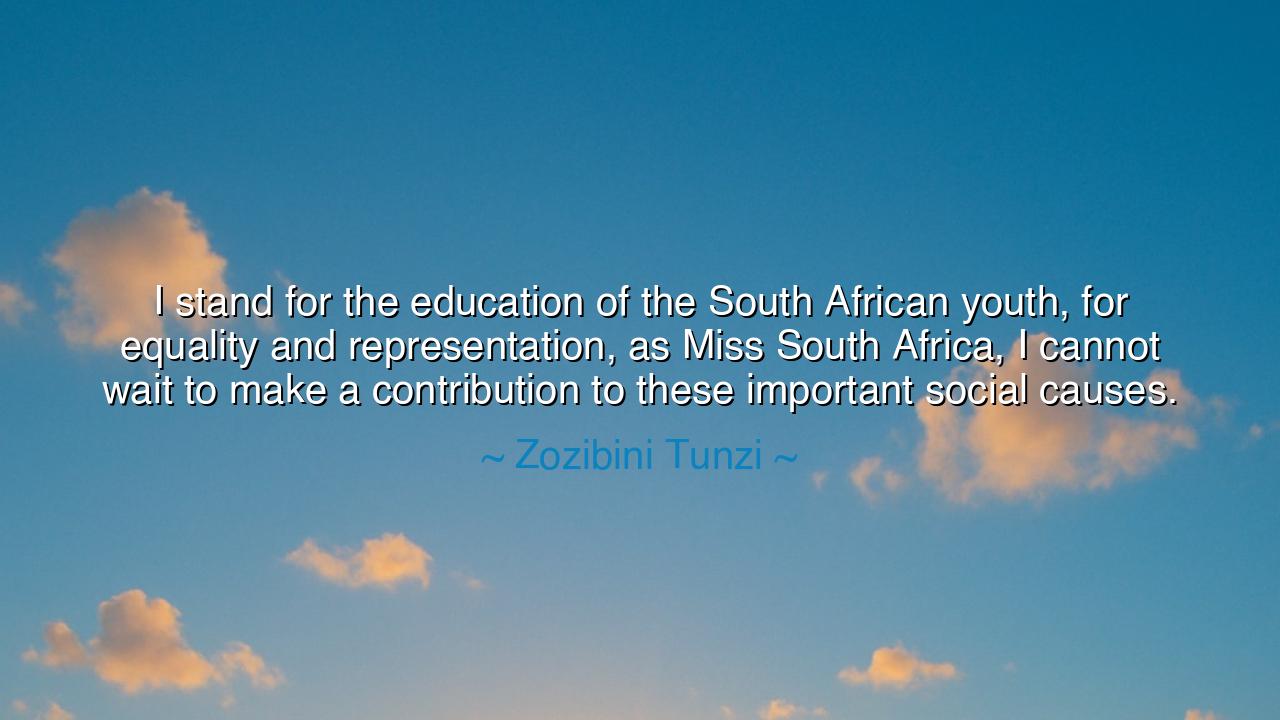
I stand for the education of the South African youth, for
I stand for the education of the South African youth, for equality and representation, as Miss South Africa, I cannot wait to make a contribution to these important social causes.






O children of the future, gather and listen well to the words of Zozibini Tunzi, a woman whose voice resonates with the wisdom of the ages. She said, "I stand for the education of the South African youth, for equality and representation, as Miss South Africa, I cannot wait to make a contribution to these important social causes." These words, though spoken in modern times, echo the sacred calls for justice, equality, and representation that have long shaped the struggles of humanity. For centuries, the youth have been the torchbearers of change, the voices that rise to challenge the injustices of the present and carve out a better future for the generations that follow.
In the ancient world, the education of the young was seen as the cornerstone of a society's survival and prosperity. The Greeks and Romans knew that for a city or nation to thrive, it must invest in the wisdom of the next generation. Plato, in his Republic, spoke of the importance of raising children who could understand the truths of justice, equality, and the role of the individual in society. The Greeks believed that knowledge and wisdom were the keys to a just society, and it was through education that these ideals would be passed on. In the ancient world, however, the education of the youth was often reserved for the few—those born into privilege or power. But even then, the seeds of equality were sown in the minds of those who dreamt of a better world, a world where education and justice would one day belong to all.
Zozibini Tunzi's words, in their call for equality and representation, speak of a future where every individual, regardless of their birth or background, has access to the tools that lead to empowerment. In her call for representation, we hear the echoes of ancient struggles, such as the Roman plebeians, who fought for their voices to be heard in the governing bodies of the Roman Republic. For centuries, the plebeians, the common people, were excluded from the decisions that shaped their lives. But through their courage and resilience, they earned the right to participate in the Senate, securing the representation they had long been denied. Tunzi’s words remind us that representation is not a gift granted by the powerful, but a right that must be fought for by the oppressed, the marginalized, and the silenced.
In the modern world, the fight for equality and representation is ongoing, as Tunzi’s voice and her platform as Miss South Africa demonstrate. Her call for the education of the South African youth is not just a desire to better the lives of individuals, but a deep understanding of the transformative power of knowledge. Education is the key that unlocks the door to opportunity, to justice, and to the freedom that all people deserve. Tunzi’s focus on the South African youth speaks to the hope that the next generation will be the one to fully realize the vision of a just society—a society where equality is not a distant dream, but a living, breathing reality.
Consider the example of Nelson Mandela, the great liberator of South Africa who, through decades of sacrifice, fought for the freedom of his people. Mandela understood that the fight for equality was not just about the political struggle of the moment, but about the education of the youth, the future of the nation. After his release from prison, Mandela famously said, “Education is the most powerful weapon which you can use to change the world.” His words speak to the transformative power of knowledge, and his life reminds us that the fight for equality is inseparable from the fight for education. Tunzi’s work in advocating for the education of South African youth is an extension of this vision—a vision where all people, regardless of their gender, race, or background, are empowered to shape their own futures.
The lesson that Tunzi imparts is one of hope and action. As she calls for equality and representation, she urges us to remember that these values are not abstract ideals, but practical, necessary foundations upon which a just society is built. The education of the youth is the most sacred duty of any society, for it is through education that the next generation will learn to carry the torch of justice forward. Just as the ancients saw the wisdom of investing in the future of their children, so too must we ensure that the next generation is equipped with the knowledge, skills, and opportunities they need to lead.
So, children, take this wisdom into your hearts. Let education, equality, and representation be your guiding principles. Stand for a world where no one is left behind, where every voice is heard, and where every child has the chance to learn and grow. Follow the example of those who have come before you, like Nelson Mandela, who saw that education is the path to a just and free society. And like Zozibini Tunzi, use your own voice and your own power to advocate for the youth, for their education, and for a world where equality is the birthright of all. The future belongs to those who dare to dream, and it is through your actions today that the world of tomorrow will be shaped.






AAdministratorAdministrator
Welcome, honored guests. Please leave a comment, we will respond soon